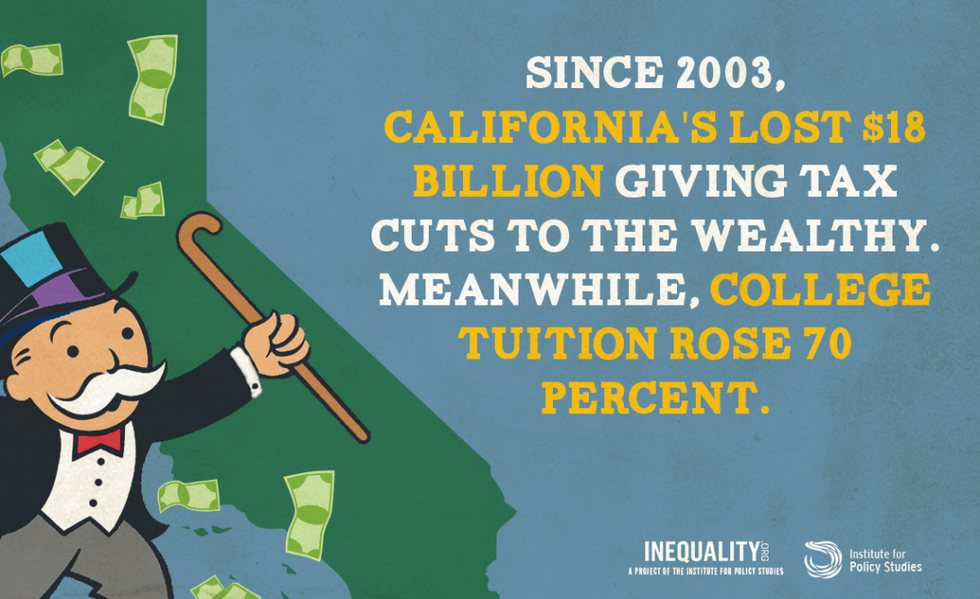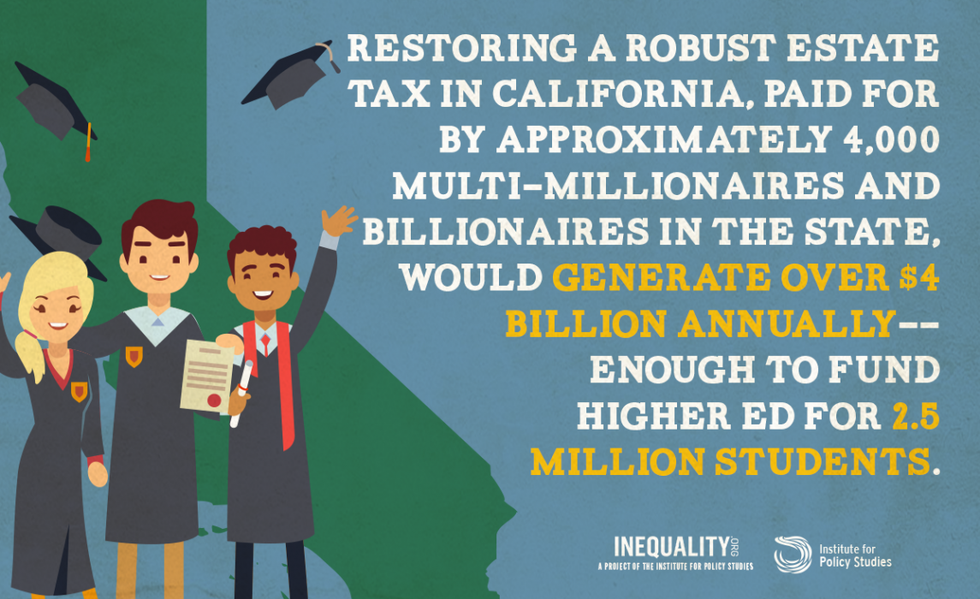"There was a time in the not-too-distant past when Californians could attend top tier research universities as well as state and community colleges without incurring student debt." (Photo: Joe Brusky/flickr/cc)
New report finds initiative to restore the California state estate tax could make college accessible for millions of students in the state.
Decades of regressive tax cuts and subsequent budget cuts have undermined the rosy reality of higher education in California. Resulting tuition increases have shifted the cost of college on to students and their parents. Restoring Opportunity: Taxing Wealth to Fund College for All in California found that $18 billion in revenue has been lost to tax cuts for wealthy Californians since 2003, and over that same period, college tuition increased by 70 percent after accounting for inflation.
This report outlines the transition from a debt-free public higher education system to one where declining state support has led to a surge both in the number of students taking on debt and in the amount of debt they take on.

Key findings of this report include:
- Due to the repeal of the California state estate tax, the state lost $18 billion in revenue between 2003 and 2016 that would have been paid exclusively by multi-millionaires and billionaires.
- Over that same period, average in-state tuition and fees for public colleges and universities went up nearly 70 percent after accounting for inflation.
- Average student debt for graduates of public colleges and universities rose 17 percent, after accounting for inflation.
- Restoring a robust estate tax in California would generate over $4 billion annually, paid for by approximately 4,000 multi-millionaires and billionaires in the state -- enough to fund higher ed for 2.5 million students.
- As the state population and college student population became more racially diverse, state support declined and the burdens of paying for college fell more heavily on students and their families.
There was a time in the not-too-distant past when Californians could attend top tier research universities as well as state and community colleges without incurring student debt. Up until the 1970s, public higher education in California was virtually free. The tradition of making high-quality public colleges and universities accessible to students of all economic backgrounds is threatened by tax cuts for the wealthy and underfunding of higher education.

The estate tax remains among the most progressive ways for states to generate revenue. Looking into the future, the report finds if California does not take action, the state stands to lose another $5-6 billion by 2019. These are funds that could fill a substantial hole in the state's unmet commitment to public higher education.
Now nationally, over 44 million households are holding student debt totaling over $1.4 trillion, surpassing credit card debt and auto loans. Average per student debt for last year's graduating class exceeded $37,000.
The organization, California College for All, has generated a ballot initiative campaign focused on the 2020 election to restore debt-free higher education to California, funded by the restoration of the state estate tax. This is a model other states can use to give their residents access to higher education without the burden of untenable student debt. There are currently multiple College for All proposals under consideration at the federal level championed by Senators Bernie Sanders and Brian Schatz to greatly expand investment in public higher education for the next generation.
This work is licensed under a Creative Commons Attribution-Share Alike 3.0 License.
Chuck CollinsJosh HoxieJosh Hoxie directs the Project on Opportunity and Taxation at the Institute for Policy Studies.
Decades of regressive tax cuts and subsequent budget cuts have undermined the rosy reality of higher education in California. Resulting tuition increases have shifted the cost of college on to students and their parents. Restoring Opportunity: Taxing Wealth to Fund College for All in California found that $18 billion in revenue has been lost to tax cuts for wealthy Californians since 2003, and over that same period, college tuition increased by 70 percent after accounting for inflation.
This report outlines the transition from a debt-free public higher education system to one where declining state support has led to a surge both in the number of students taking on debt and in the amount of debt they take on.

Key findings of this report include:
- Due to the repeal of the California state estate tax, the state lost $18 billion in revenue between 2003 and 2016 that would have been paid exclusively by multi-millionaires and billionaires.
- Over that same period, average in-state tuition and fees for public colleges and universities went up nearly 70 percent after accounting for inflation.
- Average student debt for graduates of public colleges and universities rose 17 percent, after accounting for inflation.
- Restoring a robust estate tax in California would generate over $4 billion annually, paid for by approximately 4,000 multi-millionaires and billionaires in the state -- enough to fund higher ed for 2.5 million students.
- As the state population and college student population became more racially diverse, state support declined and the burdens of paying for college fell more heavily on students and their families.
There was a time in the not-too-distant past when Californians could attend top tier research universities as well as state and community colleges without incurring student debt. Up until the 1970s, public higher education in California was virtually free. The tradition of making high-quality public colleges and universities accessible to students of all economic backgrounds is threatened by tax cuts for the wealthy and underfunding of higher education.

The estate tax remains among the most progressive ways for states to generate revenue. Looking into the future, the report finds if California does not take action, the state stands to lose another $5-6 billion by 2019. These are funds that could fill a substantial hole in the state's unmet commitment to public higher education.
Now nationally, over 44 million households are holding student debt totaling over $1.4 trillion, surpassing credit card debt and auto loans. Average per student debt for last year's graduating class exceeded $37,000.
The organization, California College for All, has generated a ballot initiative campaign focused on the 2020 election to restore debt-free higher education to California, funded by the restoration of the state estate tax. This is a model other states can use to give their residents access to higher education without the burden of untenable student debt. There are currently multiple College for All proposals under consideration at the federal level championed by Senators Bernie Sanders and Brian Schatz to greatly expand investment in public higher education for the next generation.



